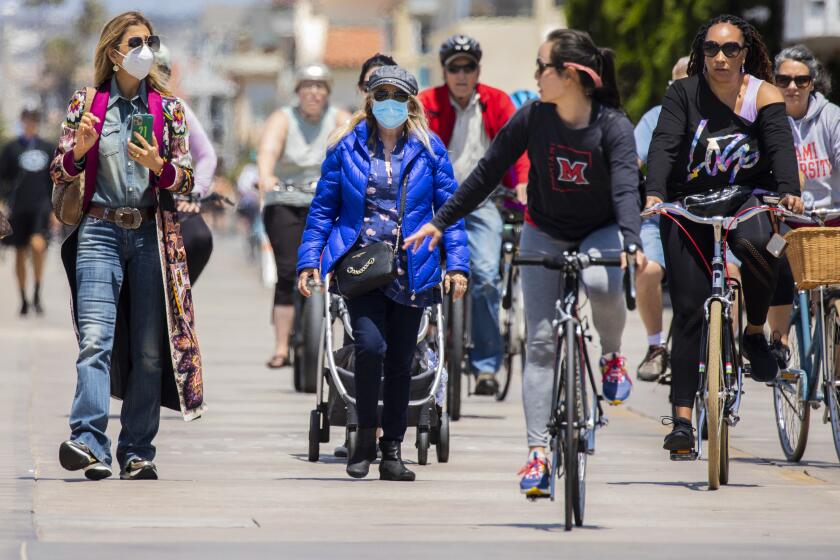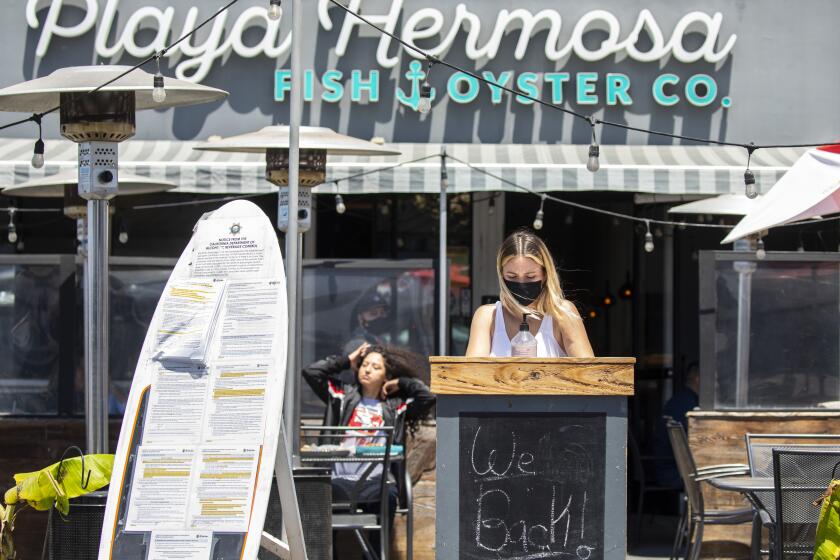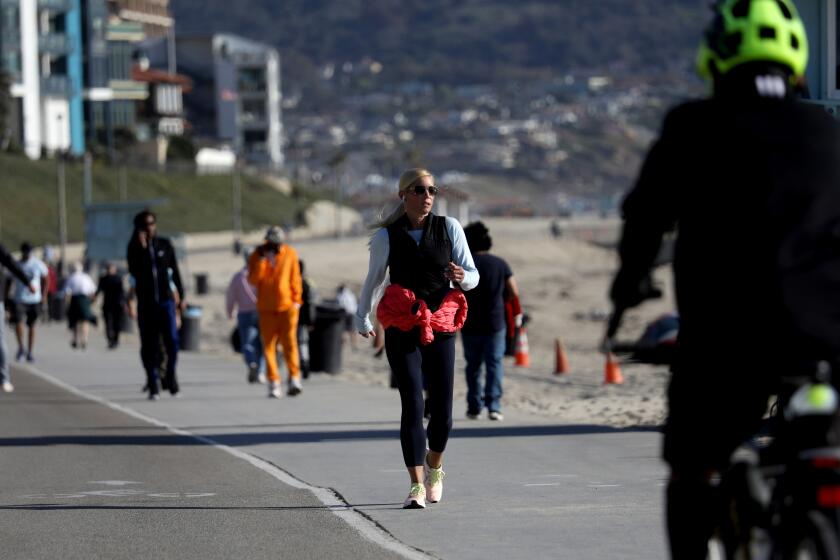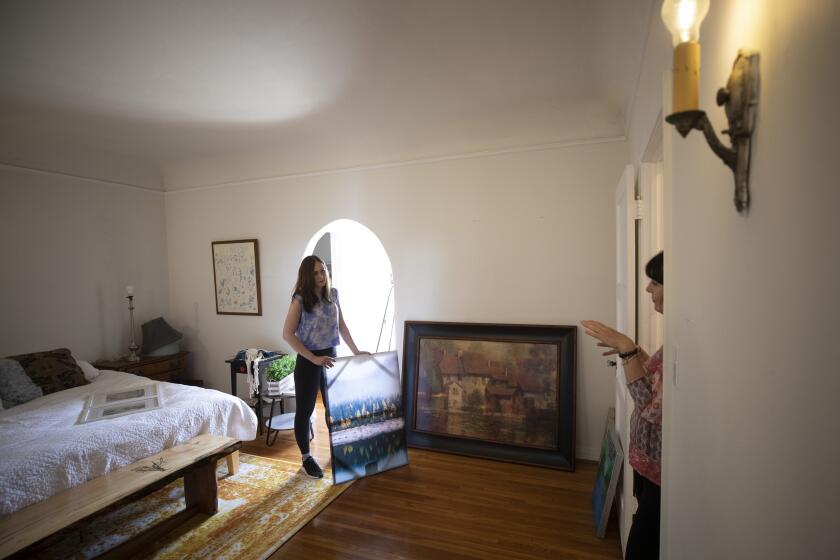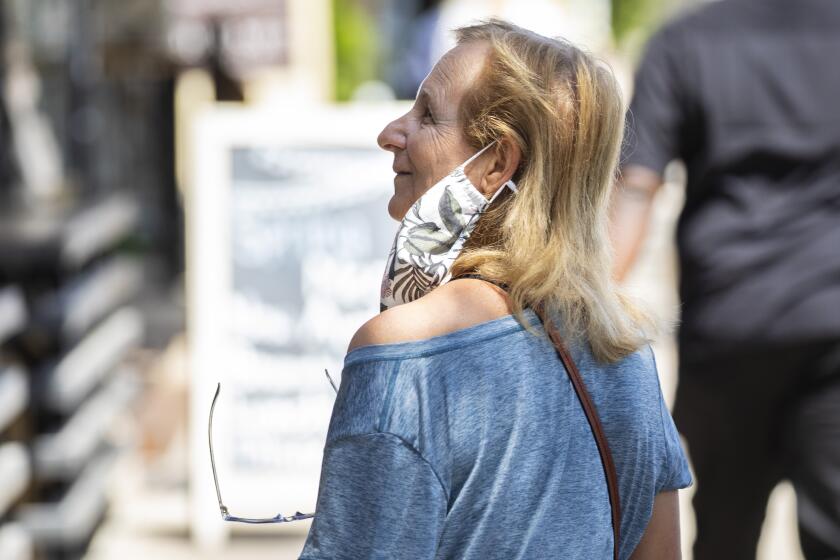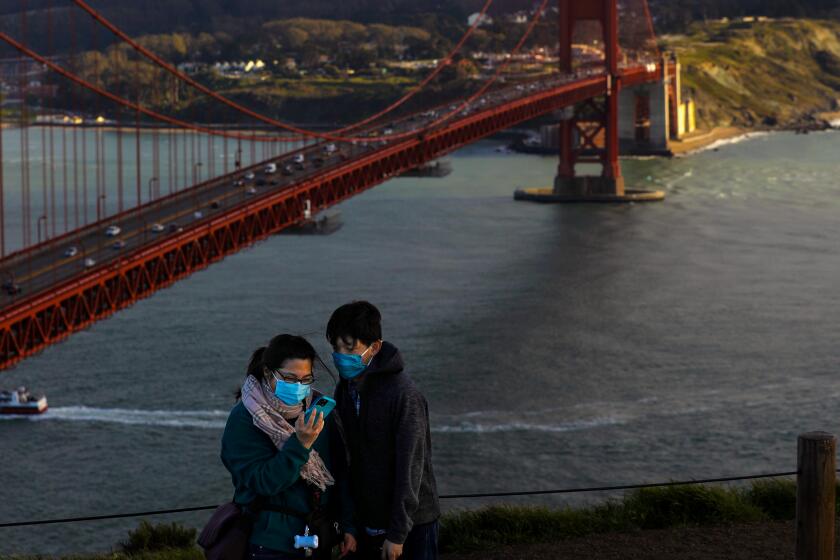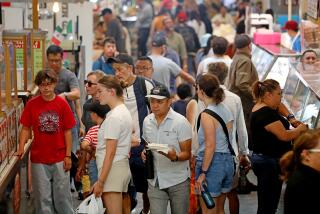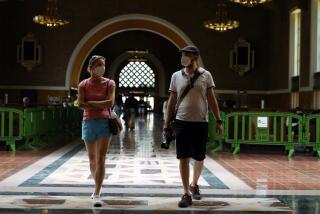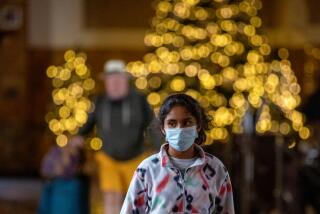Wearing a mask may go from a symbol of responsibility to vulnerability as California reopens
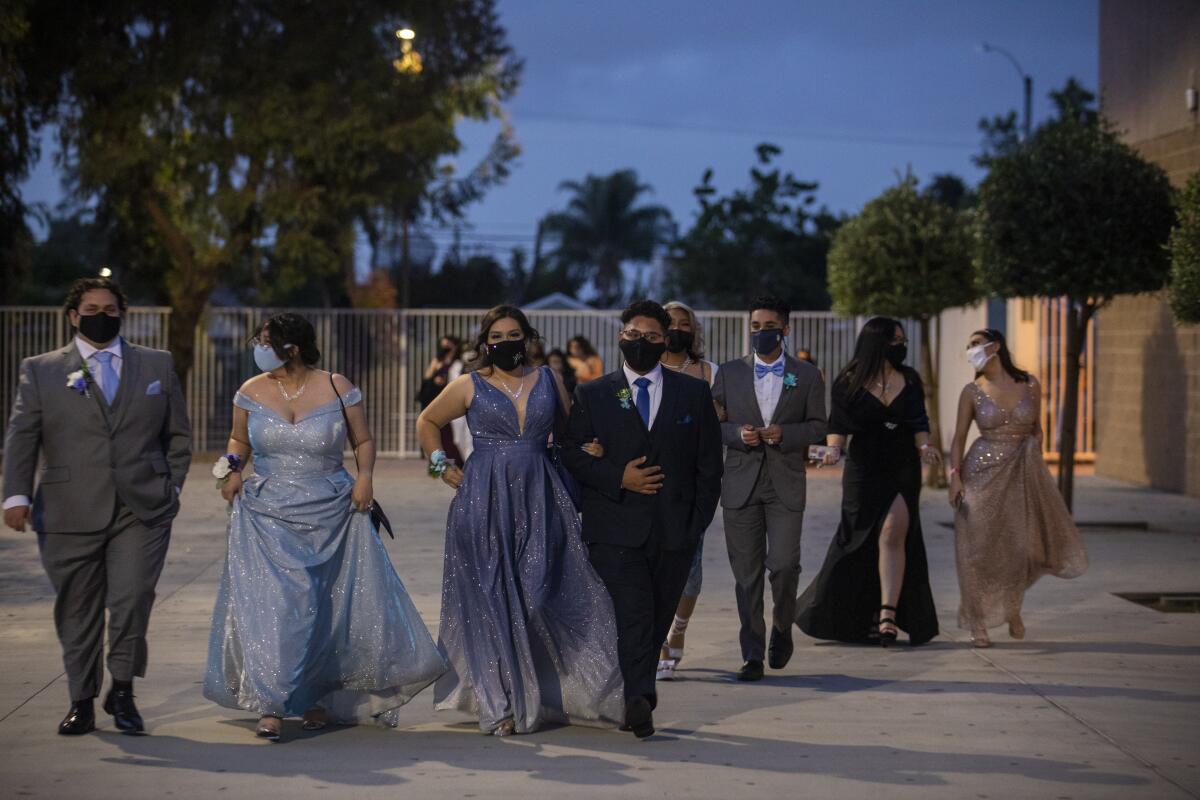
With California’s full economic reopening days away, there remains one question that has not been fully resolved in the minds of many eager to get back to normal life: To mask, or not to mask?
Beginning Tuesday, most of California’s mask rules imposed during the COVID-19 pandemic — covering customers’ trips to the store, the gym and restaurants — will disappear for those who are vaccinated.
There is growing evidence of the shots’ power to prevent serious disease and blunt transmission of the coronavirus, and health officials are increasingly unified in their belief that those who are fully inoculated can safely resume many activities without wearing face coverings.
Yet after more than a year of playing it safe, some are still planning to wear masks in crowded indoor public places when they cannot be sure that everyone around them has been vaccinated. Some public health experts say they will still probably wear masks for those occasions, while others say they feel perfectly comfortable dropping them even in those settings.
That divergence is symbolic of a new era California faces come Tuesday, when people will make their own choices as to whether to continue wearing masks, even if they’re no longer required. While the unvaccinated are still required to mask up in most settings, there historically hasn’t been much government enforcement tied to such mandates.
And given the heated debates over masking, officials are already warning the public against heaping scorn or dirty looks on those who decide to remain masked. Officials say it would be a mistake to start thinking that a face covering is indicative of someone’s vaccination status.
“This is very nuanced still, and there are some people for whom mask wearing is still life saving,” Los Angeles County Public Health Director Barbara Ferrer said this week.
The long-promised change will take effect Tuesday, the same date as the state’s full economic reopening, and bring the state into alignment with the CDC’s COVID-19 guidelines.
As of Tuesday, the state’s planned reopening date, California will align with recommendations from the U.S. Centers for Disease Control and Prevention that fully vaccinated people largely no longer need to mask up — with some exceptions that include transit hubs or aboard public transportation; in healthcare settings and long-term care facilities; indoors at K-12 schools, childcare facilities or other youth settings; in homeless shelters, emergency shelters and cooling centers; and in correctional facilities and detention centers.
By contrast, people not yet fully vaccinated will be required to wear masks in businesses and public indoor settings, including retail stores, restaurants, theaters and family entertainment centers.
Theoretically, this creates an easy-to-understand standard: fully vaccinated equals no mask.
But in practice, the state stepping back essentially passes the buck to individuals to decide how comfortable they are with tossing aside their face coverings, and to many venues and proprietors to determine whether to still require them for the public, or whether they want to get in the tricky business of verifying if someone has actually gotten vaccinated.
According to the state, operators can either allow customers to self-attest that they’re vaccinated and therefore can enter without wearing a mask, implement some kind of vaccine verification system or require all patrons to wear a mask.
A California workplace safety board recommends ending mask rules for workers if everyone in a room is vaccinated against COVID-19.
Workplaces themselves will still be governed by the standards set by the Occupational Safety and Health Standards Board, which votes on proposals submitted by the California Division of Occupational Safety and Health, or Cal/OSHA. On Wednesday night, Cal/OSHA officials suggested they will submit proposed new standards next week that are expected to incorporate California’s new mask rules.
But for many, the question over whether to remain masked comes down to your level of risk tolerance. For a fully vaccinated person, is it worth it to still wear a face covering even though the chances of infection are exceedingly low?
L.A. County’s health officer, Dr. Muntu Davis, said he’ll still likely stick to the habits to which he’s long been accustomed, such as wearing a mask and keeping distance in indoor or crowded settings.
He’s not the only one: Some experts will continue wearing a mask while in a supermarket or in line at a cafe for now, saying they’d rather take the extra precaution to avoid an exceedingly rare illness. Others might still mask up primarily to make other people feel more at ease.
Increasing evidence about the effectiveness of COVID-19 vaccines and California’s low case rates convince experts it’s safe to stop wearing masks.
Davis and other medical experts agree that immunity provided by full vaccination is extraordinarily effective at preventing infection and illness, even when it comes to the identified coronavirus variants. Of the more than 135 million people in the U.S. who had been fully vaccinated as of June 1, only 0.002% subsequently became hospitalized for COVID-19 and just 0.0004% died, CDC data show.
And of the 3.3 million L.A. County residents fully vaccinated as of May 7, only 0.03% later tested positive for the coronavirus, including people who showed no symptoms but were tested anyway because of workplace requirements.
Given all that, not all experts agree the extra caution is needed. Some say they’ll have no hesitation about heading into a store without a mask since they’re fully vaccinated, especially in places like L.A. County and San Francisco, which are reporting extraordinarily low daily coronavirus case rates not seen since the earliest days of the pandemic.
“As a fully vaccinated individual who is in living in a place with the lowest transmission rates in the country ... I would feel very comfortable not being masked everywhere that it is allowed,” said Dr. Monica Gandhi, a UC San Francisco infectious diseases expert who was among the earliest proponents of the benefits of masking in the pandemic. “I really mean this, actually: I feel like I’m modeling good behavior to show the effectiveness of the vaccines.”
For some lucky families, the unexpected time together brought on by the pandemic often felt like a gift, a bonus year to bond with parents and siblings.
Some officials fear the choice of whether to mask up could become the latest battle line drawn in a politically charged and emotionally draining pandemic.
L.A. County Supervisor Janice Hahn went so far this week as to urge the public to not shame or bully or give dirty looks to people who continue wearing masks when it’s no longer required.
The state’s guidelines recognize this, too — stating that no one can be prevented from wearing a mask as a condition of participating in an activity or entering a business.
“We want to make sure that those who have been vaccinated are protected and supported in their desire to wear a mask, if that is their choice,” Dr. Mark Ghaly, California’s health and human services secretary, said Wednesday.
There are some who will want to continue to wear masks even if they are fully vaccinated, Ferrer said. Such people could include those who have a suppressed immune system, are at greater risk for illness from COVID-19 or are parents of children too young to be vaccinated.
Others may simply prefer wearing a mask as additional protection not just against COVID-19, but other diseases like the flu and common cold.
Some experts also say that watching the local vaccination rate and daily coronavirus case rate would play a role in whether they’ll mask up in indoor public spaces.
By Tuesday, UC San Francisco epidemiologist Dr. George Rutherford said he probably won’t be wearing a mask when at a supermarket or waiting in line at a cafe in, say, San Francisco. The city is averaging just 1.7 new coronavirus cases a day per 100,000 residents over the past week and 72% of residents are at least partially vaccinated.
But he might make a different decision if he was in Redding, a city in Northern California’s Shasta County where there are 8.4 new coronavirus cases a day per 100,000 residents and only 36% of residents are at least partially vaccinated.
“If you’re up in, say, Redding, or someplace like that, where there’s very low vaccination levels, and there’s not a lot of adherence to mask wearing [among unvaccinated people] ... I might be more inclined in a place like that” to wear a mask, Rutherford said. “But I’m fully vaccinated. I really don’t worry about it very much.”
From mask rules to social distancing, here’s what to expect come June 15.
Rutherford also might mask up in other situations, such as at a movie theater or other crowded indoor venue, like a “mega” event with 5,000 or more people.
“There might be people who are infectious in that space,” he said. “And the more infectious people there are, the more likely you are to see a vaccine failure.”
Such failures are uncommon, on the order of a 1 in 5,000 chance.
“But, you know, I’m 69. I don’t want to be that 1 in 5,000,” Rutherford said. “So I’m gonna take a little extra precaution.”
It’s possible that some businesses may opt to continue requiring customers to wear masks to enter even if they are fully vaccinated, both to reduce the risk of unvaccinated people breaking the rules and entering without wearing a mask and, potentially, to make customers feel more comfortable.
The L.A. County Department of Public Health says it’s perfectly reasonable for a business to require all customers to be masked if it’s going to be hard to determine who is vaccinated or not, at least until L.A. County achieves herd immunity, “which we are definitely not at yet,” Ferrer said.
L.A. County could be at herd immunity by summer’s end, says Public Health Director Barbara Ferrer, but ‘we have a lot of people not vaccinated still.’
In Illinois, Michigan, New Mexico, New York and Washington — all of which eased mask mandates shortly after the CDC’s new guidance last month — officials continued to observe decreasing daily coronavirus cases, she noted. Importantly, all of those states now report at least 60% of their adult population having received at least one dose of vaccine.
In California, more than 71% of adult residents have received at least one dose of vaccine. In L.A. County, about 65% of residents age 16 and up have received at least one shot to date.
“This is promising news. And we’re hopeful that with our continued efforts to vaccinate L.A. County residents, we’ll also be able to maintain our low case rates once we move into a full reopening,” Ferrer said.
More to Read
Start your day right
Sign up for Essential California for news, features and recommendations from the L.A. Times and beyond in your inbox six days a week.
You may occasionally receive promotional content from the Los Angeles Times.
